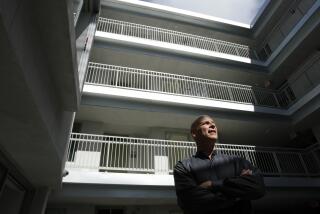CRENSHAW : Carpenters on Thrifty Project File Suit
- Share via
A partnership between a Long Beach general contractor and four South-Central-based contractors that was heralded as a trailblazing collaboration in post-riot Los Angeles has disintegrated into acrimony.
The Collins Group, four contractors who are members of the Black Carpenters Assn., has filed a lawsuit in Los Angeles Superior Court alleging that Har-Bro Inc. misled them about how much profit they would receive for helping rebuild a Thrifty drugstore at Crenshaw Boulevard and Rodeo Place that burned in the 1992 riots.
According to the recently filed lawsuit, Rod White, William Collins, Jake Bellamy and Michael Matthews received only $34,000 instead of the roughly $300,000 in profits they were expecting.
Har-Bro attorney Paul Nankivell said the company also expected to make more money, but that job delays and unexpected construction costs deflated profits to next to nothing.
“The total cost is still being ironed out, but we just didn’t make the money the Collins Group assumed we would make,” Nankivell said. “Being unfamiliar with large construction jobs, I think they had unreal expectations.”
The partnership received national media attention after Thrifty awarded the $1.3-million contract to the joint venture in January, 1993. Har-Bro approached the Black Carpenters Assn. about forming the partnership after Thrifty stipulated that 50% of the subcontractors and work force had to be members of minority groups.
White said the partnership with Har-Bro seemed too good to be true. Finally, said White, here was a chance to employ sizable numbers of black workers on a job in the community. It seemed like an opportunity to redress a longstanding complaint of employment exclusion that blacks and other minorities frequently have leveled at commercial builders.
“We were the adolescents, and they (Har-Bro) were the mentors, but we were deceived,” White said. “We did all the work on the project but aren’t reaping any benefits. We did everything in good faith because we were so anxious to do the job, help our people.”
The Collins Group paid 17 subcontractors, nearly all members of the Black Carpenters Assn., to finish the work over 10 months. The Collins Group received the $34,000 in increments over that time in addition to money for materials and labor.
Both sides say that tensions increased in the partnership over the course of construction, which began in February, 1993, and ended in November. Nankivell said Har-Bro was not satisfied with the work of some subcontractors, and delays set in as work had to be redone or new workers hired.
Collins Group members say Har-Bro fired some subcontractors unnecessarily in the middle of jobs and brought in cheaper, mostly Latino workers to finish up. Har-Bro filed bonds against two subcontractors, leading to the suspension of their state licenses and forcing one out of business.
Despite the problems, Bellamy said he and his partners were determined to finish the job, the largest one the association had ever been awarded. Association attorney David Ganezer accused Har-Bro of exploiting that desire. “It was like, ‘We got good press from getting black partners and black subcontractors, so we can get rid of these guys,’ ” he said.
Nankivell called the allegations “unfortunate.”
“Har-Bro is an open book,” he said. “I’ve told them many times they’re welcome to do an audit.”
More to Read
Sign up for Essential California
The most important California stories and recommendations in your inbox every morning.
You may occasionally receive promotional content from the Los Angeles Times.













